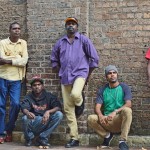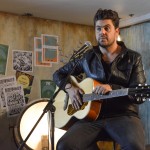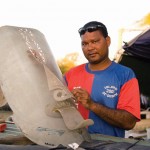There’s no place like home, and although Buddy Knox was born a world away from Memphis in the United States, being a blues man through and through, his upcoming trip to Memphis early next year feels every bit like a homecoming for the award-winning musician – and that’s because once the blues get a hold of you, they’re awfully hard to shake. Boiling up from the murky swamps and plantations of the deep American South, the blues, with its signature scale, tone, guitar strumming and storytelling, was the raw expression of the African American experience – a feeling more than a sound. It was moulded by the harsh realities of survival, poverty and racism, and at the same time infused with a spirit of resilience, humour and authenticity that places it in a unique, timeless category all of its own. With that in mind, it’s little wonder that the music of black struggle in America would strike a chord with Aboriginal people here through the generations, and in particular, a young fella from Toomelah by the name of Buddy Knox. The son of Australia’s most famous Aboriginal country musician, Roger Knox, Buddy first picked up a guitar at age 10, with the ambition of playing just like Chuck Berry – today, many refer to him as Australia’s own B.B. King. While these days Buddy brandishes a Gibson 335, from which he conjures his mind-bending riffs and blues licks, he says it all started with a “Toomelah mission axe” with missing strings, and plenty of passion. While growing up, he had a wide range of country-music influences to choose from, including his father, but as time wore on it was towards the blues, and its many legends, that Buddy’s eyes, heart and ears were drawn. “I haven’t got the blues… the blues have got me!” says Buddy. With his band Euraba, Buddy’s father Roger was a towering figure in Aboriginal music. At the same time, the growing Aboriginal rights movement was in full swing. It was the 1970s, and as one of the most famous Aboriginal men in the country, Roger was involved in the movement, playing a role in establishing the Tent Embassy, and a young Buddy was there… soaking it all in. “Growing up, it was tough doing your thing the way you wanted to do it,” says Buddy. “Coming from where you were from, it made you a little angry, I still feel some of the effects of it even today, and I wasn’t only around my father, but also Bobby McLeod, Paul Coe, Gary Foley… I know these people, so being around them made you a little staunch. So you get a little angry, but you’ve got to move forward, but it’s with you because you can’t help it and it makes you who you are.” After decades of refining his craft, Buddy formed his own band in 2006, The Buddy Knox Blues Band. It was a pivotal moment in a life-long journey through music and song that had culminated in a special understanding and relationship with blues music, and a deep knowledge of the old, legendary blues men. Instantly claiming live spots at the major blues and roots festivals, as well as others, and picking up a swag of awards along the way, in 2008, Buddy and the band released their first album, The Factory, followed late in 2010 by Buddy’s Blues. “The thing about the new album is that while we’ve been influenced by a lot of things from listening to a lot of blues, we put together some original songs for it,” explains Buddy. Alongside the originals are some blues classics, songs that are unearthed, lost, then found again, carried down the generations and passed on until they take on a quality and life of their own, and it’s this quality of the blues that interests Buddy and so many other fans of the genre. Take one of the covers from Buddy’s Blues for example, “My Women has a Black Cat Bone”. “It’s an old blues song that’s been around for years,” explains Buddy, “a bloke called Hop Wilson wrote it. “Someone thought it might be about some voodoo stuff, but it isn’t. See, where Hop was livin’, it was all black fellas there, and that’s why the songs came out the way they did. The truth of it all means that his woman was playing around with another man.” The reprisal of old blues numbers from the early days, which is a staple of blues music, all leads in one direction. You certainly can’t fake blues music, and perhaps that’s what’s made Buddy so successful. You can see it in his walk, hear it in his talk. It’s in the rolling laugh that punctuates the end of his sentences, the distinct country drawl of his speech. It’s in his presence on stage, and of course, all over his guitar playing and singing. More than just a style of music, if the blues can act as a lens through which to view the world, Buddy is among the most authentic bluesmen in Australia that you’re likely to meet or see – which makes his pilgrimage of sorts to Memphis next year so special. “The Sydney Blues Society has a Blues Performer of the Year contest – this year, we won it,” explains Buddy. “So, if you win, you get the opportunity to go and compete again in Memphis in February 2012, so I’m going over there, but I’m not going for a holiday, I’m going to win. It’s a big deal.” With the entire band set to make the trip, February can’t come quick enough. So far, Buddy has no shortage of people putting their hand up to carry bags for the travelling troupe. “Yeah, I’ve got a line around the block,” he laughs. Still buzzing from their recent performance at the Byron Bay Blues Festival, where the band has performed for three years running and gained a growing following and reputation, in November they’ll be heading to Perth for the Blues at Bridgetown festival. Then, it’s off to Tennessee where Buddy will share his own Aboriginal style blues with some of the most passionate and talented blues players in the world – a dream come true in every sense of the world, but boy does Buddy deserve it.
Music
The best in Aboriginal & Torres Strait Islander Music
Other Music topics: Blues, Country & Western, Electronic, Folk, Gospel, Hip Hop, Jazz, Opera, Pop, R&B, Reggae, Rock, Traditional/World,






Comments are closed.